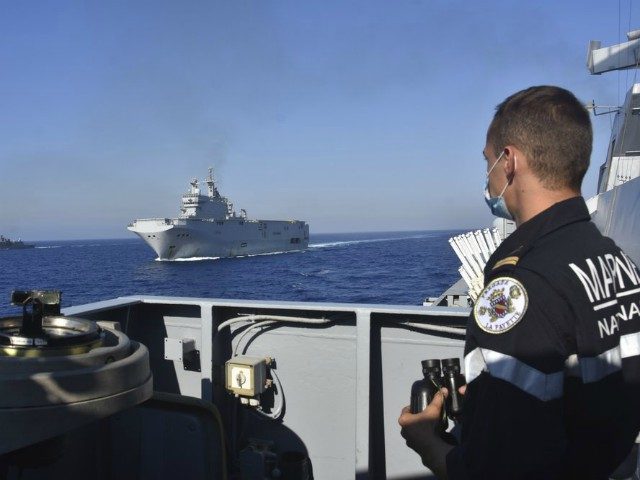ATHENS, Greece (AP) — The European Union’s foreign policy chief expressed “full solidarity” with Greece and Cyprus and urged an “immediate de-escalation” by Turkey after EU foreign ministers held urgent talks Friday on high military tensions over offshore drilling rights in the eastern Mediterranean.
For the past five days, the Greek and Turkish navies have been engaged in a game of brinkmanship in waters between the Greek island of Crete, Cyprus and Turkey over offshore drilling rights. That followed Ankara’s deployment of a seismic research vessel to prospect for potential oil and gas reserves in waters that Athens claims are located over Greece’s continental shelf.
Cyprus and Greece are EU members, while Turkey is not. Josep Borrell, the 27-nation bloc’s foreign policy chief, tweeted after the end of the talks: “Eastern Med: Full solidarity (with) Greece&Cyprus. Calling for immediate de-escalation by Turkey and reengaging in dialogue.”
Greek Foreign Minister Nikos Dendias, who also met in Vienna with U.S. Secretary of State Mike Pompeo, said he was “pleased” with the solidarity expressed by his country’s EU partners and their “condemnation of Turkey’s illegal behaviour.”
“Turkey is the only (party) responsible for the escalation of tension in the eastern Mediterranean, and it must immediately leave the Greek continental shelf,” Dendias said after Friday’s talks. “That is a necessary precondition for de-escalation.”
Turkish President Recep Tayyip Erdogan said Turkey would press ahead with its prospecting until Aug. 23 as planned. But following a phone call with German Chancellor Angela Merkel, he signalled that Ankara and Berlin had agreed to a “softening” of positions after that date.
There was no indication from Athens whether it had been consulted, or had agreed, on the matter. Merkel had interceded to defuse a similar face-off between Greece and Turkey a few weeks ago.
Erdogan also warned that Turkey would strongly respond to any “harassment” of its vessels by Greece.
Dendias said Greece was open to talks with Turkey, “but obviously not while subject to pressure and blackmail.”
Relations between the historic regional rivals — and nominal NATO allies — have hit a more than two-decade low over the prospecting mission launched Monday.
Greece placed its armed forces on high alert and sent warships to the spot, demanding the vessels’ withdrawal. Turkey claims it has every right to prospect in the area, as well as in neighbouring waters Cyprus considers its own, after the discovery of large offshore gas deposits in recent years off Israel, Egypt and Cyprus.
With the warships dancing about each other in a relatively small patch of sea, there’s a real danger of rapid escalation in the case of an accidental collision or hostile act.
German Foreign Minister Heiko Maas, whose country holds the rotating EU presidency, said before the talks that “the provocations” that are happening in the eastern Mediterranean “can’t continue.”
“Nor can the Turkish drilling,” he said. “We are working toward a direct dialogue between the parties that would contribute to finding a solution for this issue.” Maas added that there should be no drilling during any negotiations.
Apart from backing from its EU partners, Athens is also seeking a commitment for potential EU sanctions against Turkey. Dendias said a list of possible sanctions is being drafted and will be discussed at the next foreign ministers’ meeting in Berlin later this month.
In a strong show of support this week, France pledged to boost its military presence in the eastern Mediterranean and sent two warships to the area Thursday for joint drills with the Greek navy. France also deployed two fighter planes to Crete.
French relations with Turkey, which is not an EU member, are already bad over Ankara’s involvement in Libya’s civil war.
French President Emmanuel Macron tweeted Friday that he spoke to U.S. President Donald Trump about the situation in the eastern Mediterranean, Libya and Lebanon.
“We share the same views. Peace and security in the region is in our common interest, which we will uphold,” Macron said.
Erdogan said that during his call with Merkel late Thursday, the German chancellor requested a “softening of the issue and to proceed in a more protective understanding.”
“We agreed,” Erdogan told reporters, adding that he hoped the Greek leadership would “reach the same point.”
Erdogan added: “We will not leave unanswered the slightest attack against our civilian ships.”
The Turkish leader also said his country had responded to an incident involving the Turkish research ship Oruc Reis.
Greek officials said they were unaware of any incident Thursday, and the Foreign Ministry said Dendias would brief his EU partners from Vienna on “the true events during recent days concerning operational incidents in the area.”
In Switzerland meanwhile, Turkish Foreign Minister Mevlut Cavusoglu said Turkey does not seek an escalation and called on the EU to convince Greece to act with “reason.” He also accused France of engaging in “bullying” in the eastern Mediterranean.
“Instead of indulging Greece and giving unconditional support, the EU should invite (Athens) to act with reason,” Cavusoglu told reporters during a news conference with his Swiss counterpart.

COMMENTS
Please let us know if you're having issues with commenting.